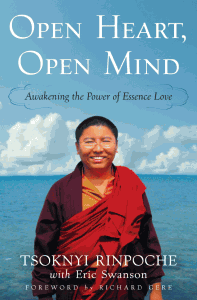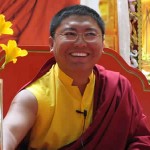Wednesday
Featured StoriesBook Review: Open Heart, Open Mind
 A Look at Tsoknyi Rinpoche’s new book
A Look at Tsoknyi Rinpoche’s new book
by guest reviewer John Makransky
It is astounding how well Tsoknyi Rinpoche understands the cross-cultural dynamics at work when modern people try to internalize the deepest teachings of Buddhism, and how effectively he addresses those dynamics in his new book Open Heart, Open Mind.
Westerners live in a world dominated by science, instrumental rationality, and competition. Our eighteenth century Age of Reason taught us to put faith only in our thinking (“I think, therefore I am”), not to explore the fuller embodied awareness that Buddhism points us to. Many of us harbor the thought of ourselves as intrinsically unlovable, perhaps due to the socio-economic competition that ties our worth just to our current usefulness or success, instilling fear from a young age that we can never be reliably worthy of love.
Such socially conditioned anxiety and self-dislike, as Tsoknyi Rinpoche points out, becomes embedded in our minds and psycho-physical energies, inhibiting access to the heart of awakening, the recognition that oneself and all others are primordially pure, deeply worthy of love, and endowed with vast potential. Unless the ingrained patterns of our social conditioning are directly addressed (and Asian pedagogies were not designed to do so), we may be hindered from fuller access to the liberating power of the dharma.
The brilliance of Tsoknyi Rinpoche’s book lies in his crystal clarity on these dynamics, and the effectiveness of his methods for cutting through them to reawaken the innate spark of awareness and loving energy that is hidden in our being.
Rinpoche teaches through personal stories of struggles and inspirations, his own and others’. Told by a revered lama, his personal stories can be shockingly frank, yet are precisely targeted to show how our subconscious patterns of thought, feeling and energy can obstruct our potential, and to impart practices that gently heal and release those patterns. Rinpoche thereby transmits, in the most affectionate and gentle ways, the very heart of awakening from the Dzogchen and Mahamudra traditions of Tibet.
In the book’s first pages, Tsoknyi Rinpoche describes the fear of falling he felt in Malaysia years ago when stepping onto a transparent glass bridge between skyscrapers. “Paralyzing fear is not, perhaps, the response one might expect” from a Tibetan lama, he admits. Yet by sharing his fears with us, he helps enter us into the same deep process of healing that he underwent. The key is kindness and respect for every aspect of our being: “Working with patterns [like fear] requires great kindness and gentleness: the same qualities parents apply when they comfort children crying in the dark…. I stepped for a third time onto the bridge, … acknowledging the fear and letting it come up within an open, comforting embrace instead of trying to push it away. With each step I gained more confidence. The tight knot of physical sensations, emotions and thoughts began to loosen.”
To be present to our emotions with such gentleness and respect shows us how to be present to others caught in similar patterns (compassion) while drawing our minds toward the view of Dzogchen and Mahamudra (wisdom) that embraces everything in its openness, clarity and warmth.
A practical problem for modern people is the inner blockage we may experience as we try to open to awakening qualities in the nature of our minds. Purely intellectual, cognitive training is not enough, for it leaves untouched the energetic and emotional knots imprinted by years of conditioned reaction in our fast paced lives. Rinpoche provides new access to the practice of subtle energy from Tibetan tantric tradition that helps us release, from the inside, our psycho-physical barriers to awakening.
The journey unfolds as layers of habitual fear learned from our youth gradually unwind to reveal the child-like freedom and wonder with which we were born: “In the process [of my Tibetan lama training,] I learned something quite startling. The youthful freedom I longed for was no different than the freedom of heart that the Buddha … had taught. The discipline of my training was aimed at helping people work with their patterns, to embrace them with the same warmth, openness, and curiosity with which most of us approached the various phenomena we encountered as very young children.”
As Rinpoche shares many further stories, fresh ways of imparting Buddhist teachings, and simple meditations, we discover that what needs healing in us is what needs healing in others, that the inner wisdom, openness and warmth that does this healing is our deepest identity, and that all of our experiences and relationships can become the means to express that identity. Tsoknyi Rinpoche is not merely giving us methods of self-healing, but returning us to our deepest being, Buddhahood, by showing us how to let all that hides it gently fall away.
~~
 Tsoknyi Rinpoche was recognized by His Holiness the 16th Gyalwang Karmapa as the reincarnation of Drubwang Tsoknyi Rinpoche II. He is a renowned master of the Drukpa Kagyu and Nyingma traditions and holder of the Tsoknyi Lineage, which is based on Ratna Lingpa’s termas. His fresh insights into the western psyche have enabled him to teach and write in a way that touches our most profound awareness, using metaphors, stories and images that point directly to our everyday experience. He is widely recognized as a brilliant meditation teacher, is the author of three books, Open Heart, Open Mind, Carefree Dignity, and Fearless Simplicity, and has a keen interest in the ongoing dialogue between western research, especially in neuroscience, and Buddhist practitioners and scholars. For more information, visit his website: www.tsoknyirinpoche.org
Tsoknyi Rinpoche was recognized by His Holiness the 16th Gyalwang Karmapa as the reincarnation of Drubwang Tsoknyi Rinpoche II. He is a renowned master of the Drukpa Kagyu and Nyingma traditions and holder of the Tsoknyi Lineage, which is based on Ratna Lingpa’s termas. His fresh insights into the western psyche have enabled him to teach and write in a way that touches our most profound awareness, using metaphors, stories and images that point directly to our everyday experience. He is widely recognized as a brilliant meditation teacher, is the author of three books, Open Heart, Open Mind, Carefree Dignity, and Fearless Simplicity, and has a keen interest in the ongoing dialogue between western research, especially in neuroscience, and Buddhist practitioners and scholars. For more information, visit his website: www.tsoknyirinpoche.org
John Makransky is an Associate Professor of Buddhism and Comparative Theology at Boston College, and is the author of Awakening through Love.
















